新编大学英语综合教程3第三版unit9music
- 格式:docx
- 大小:136.70 KB
- 文档页数:6

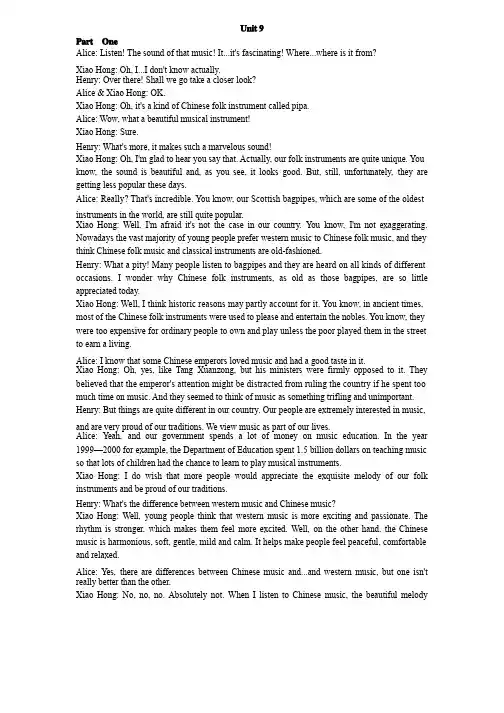
Unit 9Part OneAlice: Listen! The sound of that music! It...it's fascinating! Where...where is it from?Xiao Hong: Oh, I...I don't know actually.Henry: Over there! Shall we go take a closer look?Alice & Xiao Hong: OK.Xiao Hong: Oh, it's a kind of Chinese folk instrument called pipa.Alice: Wow, what a beautiful musical instrument!Xiao Hong: Sure.Henry: What's more, it makes such a marvelous sound!Xiao Hong: Oh, I'm glad to hear you say that. Actually, our folk instruments are quite unique. You know, the sound is beautiful and, as you see, it looks good. But, still, unfortunately, they are getting less popular these days.Alice: Really? That's incredible. You know, our Scottish bagpipes, which are some of the oldest instruments in the world, are still quite popular.Xiao Hong: Well, I'm afraid it's not the case in our country. Y ou know, I'm not exaggerating. Nowadays the vast majority of young people prefer western music to Chinese folk music, and they think Chinese folk music and classical instruments are old-fashioned.Henry: What a pity! Many people listen to bagpipes and they are heard on all kinds of different occasions. I wonder why Chinese folk instruments, as old as those bagpipes, are so little appreciated today.Xiao Hong: Well, I think historic reasons may partly account for it. You know, in ancient times, most of the Chinese folk instruments were used to please and entertain the nobles. You know, they were too expensive for ordinary people to own and play unless the poor played them in the street to earn a living.Alice: I know that some Chinese emperors loved music and had a good taste in it.Xiao Hong: Oh, yes, like Tang Xuanzong, but his ministers were firmly opposed to it. They believed that the emperor's attention might be distracted from ruling the country if he spent too much time on music. And they seemed to think of music as something trifling and unimportant. Henry: But things are quite different in our country. Our people are extremely interested in music, and are very proud of our traditions. We view music as part of our lives.Alice: Y eah, and our government spends a lot of money on music education. In the year 1999——2000 for example, the Department of Education spent 1.5 billion dollars on teaching music 1999so that lots of children had the chance to learn to play musical instruments.Xiao Hong: I do wish that more people would appreciate the exquisite melody of our folk instruments and be proud of our traditions.Henry: What's the difference between western music and Chinese music?Xiao Hong: Well, young people think that western music is more exciting and passionate. The rhythm is stronger, which makes them feel more excited. Well, on the other hand, the Chinese music is harmonious, soft, gentle, mild and calm. It helps make people feel peaceful, comfortable and relaxed.Alice: Y es, there are differences between Chinese music and...and western music, but one isn't really better than the other.Xiao Hong: No, no, no. Absolutely not. When I listen to Chinese music, the beautiful melodyalways reminds me of the beauty of nature, hills, streams, small bridges and the singing of birds. You know, the melody is like the music of the nightingale, the music of running water and etc. But western music is more upbeat and exciting. I get full of energy and I want to dance and sing with it. I like rock music better than folk music actually.Henry: Rock and roll has a long history in western countries. There are plenty of bands playing different kinds of rock and roll music, like heavy metal and punk.Xiao Hong: And most of our Chinese musical instruments are made of wood, bamboo or something like that, so the music sounds natural while yours nowadays are mostly made of metal and they seem to be much more complex.Alice: Right. Take our flutes for example. They have more holes and buttons, so they rely on very precise notes to produce music.Xiao Hong: What's more, western singers are usually good at dancing while they sing, but our singers are usually only good at singing.Henry: I suppose because of cultural differences, Chinese, like their music, are usually more reserved.Xiao Hong: There are still some people who prefer Chinese folk music. The pop music nowadaysis increasingly dominated by western music.Alice: I guess people are immediately attracted to western music, but Chinese music has the mysterious power to attract you without you realizing it.Xiao Hong: Y eah, Chinese traditional culture has made a deep impact on Chinese music. Y ou know, the music emphasizes people's feelings and is very emotional.Alice: I've heard that the structure of western music is more logical than that of Chinese music.Xiao Hong: I find that the lyrics are different too. Chinese people tend to express their emotions indirectly while western people are more direct and individualistic. They make full use of music and instruments to express their personal feelings, such as excitement, disappointment, love, sorrow and etc.Henry: Western music has absorbed many musical elements from African music. It places great importance on rhythm, such as heavy metal music, rock music, hip hop and so on.Alice: Yes, and, of course, we have a number of well-known composers these days.Henry: Mm, nowadays it seems that rock and pop music dominate the musical world. In many pieces of music, one instrument can be used in order to produce a distinct sense of perception.Xiao Hong: I guess, eventually, because of globalization, the differences between western music and Chinese music may become less noticeable. You know, in the future, the music may have a lot more in common than we have realized now.Alice: Oh, as far as pop music is concerned, what you say is probably true, but even though musicis a universal language, folk music shouldn't be changed.Xiao Hong: That's right. Don't you think it would be a good idea to buy some Chinese folk music CDs to take home with you?Alice & Henry: That's a good idea! Let's go to the CD shop.Exercise 21.C2.C3.C 4,W 5,W 6.C 7.C 8.C 9.C 10,W 11.W 12.W 13.C 14.W 15.W 16.C 17.W 18.WExercise 31.perfer old-fashioned2.as old as3.account for4.own play earn to living5.very proud of6.1.5 billion had the chance7.hillls small bridges singing of birds8.full of energy9.holes buttons precise notes 10.indirectly individualistic 11.places great importance12.a universal languagePartTwo Listening I(Bill, Howard, and Lisa are talking about background music.)Part IBill: What are you working on now?Howard: I've just finished a piece of background music.Lisa: Background music? Oh, like the music they're playing here now. Howard: Yes. You hear it everywhere, in restaurants, airports, supermarkets, department stores... Bill: In banks, too. I noticed it while we were at the bank today.Lisa: Did you? I didn't.Howard: Y ou are not supposed to notice it. It's just there, in the background. It's supposed to influence your attitudes, and put you in the right mood.Lisa: I'm not sure I like that idea.Howard: Well, it seems to work. Companies pay millions of dollars every year for background music. It's supposed to give you a better feeling about yourself and the people around you. Factories use it a lot. It makes the workers happy, and they work better that way. In one factory, music increased production by 4.5 percent.Bill: I should think they'd get tired of hearing music all day.Howard: They don't though. One fellow in San Francisco told me, "If the music stops, somebody always runs to the telephone to complain."Lisa: Now that I think about it, I can't remember when there wasn't background music in restaurants and stores.Howard: That shows how young you are. Actually, it all started during World War II when some factories had their own orchestras to keep workers happy and calm. Now, of course, the music is piped in by a machine, and different kinds of music are played at different times during the day. They play faster music at 10 in the morning than at 8, for instance, because workers tend to be slower then.Part IIBill: What about restaurants? Do they play the same music for dinner and lunch?Howard: I don't know about that, but I do know that hamburger places play fast music. When they started playing faster music, they found that a customer spent only seventeen minutes eating. The time was 22 minutes before that.Lisa: So they have more people coming in and out to buy hamburgers.Howard: Exactly. And that's good for business. You can see why music has become so popular. In Los Angeles, for instance, 30 different companies are selling background music services. Lisa: I still think there's something about it that I don't quite like.Howard: I know what you mean, but lots of people wouldn't agree with you. The Xerox Corporation in Rochester, N. Y Corporation in Rochester, N. Y., spends more than $80,000 a year for background music. Prisons ., spends more than $80,000 a year for background music. Prisons use it, and farmers use it to keep their cattle calm. It's even supposed to have an effect on plants.Exercise 11.restaurants airports supermarkets 12,attitudes in the right mood the people around him happy work better 3.World War II happy calm a machine kinds of music different times faster slowerExercise 21.T2.F3.F4.T5.T6.F7.T8.FListening IIMore and more doctors are operating to music. They say it eases their minds.One doctor in Chicago says classical music is the only kind that does not interfere while he is operating. But in another Chicago operating room, the British rock group Pink Floyd can be heard. And in Washington, at least one doctor operates to the sound of the Beatles.Researchers from the State University of New Y ork at Buffalo did a study that seems to confirm that music helps reduce tension in doctors. They gave fifty male doctors difficult mathematical kinds of tests.The doctors did the test while listening to music they themselves had chosen. They did a similar test while listening to music that was chosen for them. They were tested a third time with no music at all. Each time, a machine measured their heart rate and blood pressure.The doctors worked most quickly and calmly when listening to the music they themselves had chosen. They did the worst with no music at all.What kinds of music did the doctors choose? Mostly classical. But some chose instrumental jazz pieces or Irish folk music.There probably is one piece of music that should never be played during an operation: Brahms' "Lullaby". You do not want your doctor to go to sleep while operating, do you? Exercise 11.eases their minds operations2.classical instrumental jazz folk music3.A reduce tension B. 50/fifty male doctors C. Mathematics D.1)quickly 2)calmly 3)chosen for them 4)No music 5)the worst E. sleepyExercise 21.T2.F3.T4.F5.FPart ThreePractice OneThe Beatles were probably the most important pop and rock group of all time. They were together for only eight years, but their influence has lasted much longer.The Beatles came from Liverpool, England. They started playing together in 1962, although Paul McCartney and John Lennon played together in another group. They started by playing rock'n' roll songs, but they quickly developed their own style. By 1963, they had become Britain's top rock group. A year later they toured the United States, where they attracted millions of fans.By the time the Beatles broke up in 1970, they had changed the nature of rock and pop music. They introduced new sounds and rhythms, and they experimented with different types of musical instruments. They recorded hundreds of songs and they sold millions and millions of records. They made many films and won many awards for their music.Today, the Beatles' songs are still very famous all over the world.Exercise 1B D A CExercise 21.their own style2.the nature3.sounds experimented4.songs records5.films awardsPractice Two(Dennis is interviewing Stephanie, a music teacher.)Dennis: Which do you think is the easiest instrument for people to learn to play?Stephanie: It's difficult to answer that question because learning to play an instrument is one thing, and learning to play it well is another. But I think the guitar is the easiest to learn. It's one of the easiest to carry, and that's important for a musician.Dennis: And the second?Stephanie: My second choice is probably the most popular instrument, and I think it's the most satisfying, too, because you can make more progress at the beginning. That's the piano.Dennis: So you think playing the piano's more difficult than playing the guitar.Stephanie: Yes, because, well, your left hand has to work as hard as your right and both hands have to make notes. With the guitar, you make the notes with the left hand, and the right just picksthe strings.Dennis: Is playing a woodwind or brass instrument very difficult? It looks quite easy.Stephanie: I think the clarinet and the trumpet are the easiest to learn. Finding the notes is quite easy and breathing isn't a serious problem. But I find all the wind instruments less satisfying for people to play, because you can't do much alone. You have to play with others.Dennis: And which do you think is the most difficult instrument to play?Stephanie: No doubt at all, the violin. And I think it's the most difficult because both hands have to work, but they have to do different jobs. I mean, the left hand makes the notes on the strings, andit's harder to find the notes than on the guitar because the strings are shorter. The right hand has to manage the bow, and bowing well is an art. Finally, the most difficult thing about it, I find, is holding the instrument under your chin. It's not a natural position to adopt.Exercise 11.(1)trumpet (2)piano (3)violin 2(2)piano (1)clarinetExercise 21.picks the strings2.as hard as3.makes the notes4.on the strings5.manages the bowExercise 31.learn2.carry3.popular4.satisfying5.progress6.easiest7.less satisfying8.most difficultPractice Three(Four people, Steve, Connie, Diane, and Martin, are giving their opinions about their favorite musicians before attending an international concert.)Steve: Oh, no doubt about it. My favorite's Bruce Springsteen. He's the best there is. I think he's more direct, he communicates better than the others. It's not that the others are bad, but he's better.In a way his kind of rock music's more old-fashioned than, er, Sting's, say, but for me it's moreexciting. And the messages in his songs are simpler. They're easier to understand than Sting's or Peter Gabriel's, so I can relate to them better.Connie: The singer I want to hear most is Peter Gabriel. He's not really one of my favorite singerssingers——I mean I don't think he's as exciting as Bruce Springsteen, for instance—but his latest songs, these African songs with African rhythms, well, they're more musical than pop songs usually are. And I think all the singers are sincere about the human rights movement, but he feels more deeply about it than the others.Diane: Oh, I think Sting and his band are the best. Sting's better now with his new band than during his time with the Police. He seems more natural and I think he enjoys playing more. And he's a much better songwriter now. The one I like most in the band is the sax-player, Branford Marsalis. He plays brilliantly, but the best thing about him is his sense of humor. He really makes me laugh!Martin: To tell you the truth, I'm looking forward most to hearing Youssou N'Dour. I like Peter Gabriel's African songs, but he's an Englishman, not an African, so it's not the same as the real thing. I mean, real African music is different from reggae and rock, because it's more rhythmic than reggae, but not as heavy as rock. The rhythms are very unusual, too, and more sophisticated than people think.Exercise 11.T 2,T 3,T 4.F 5.F 6.F 7.F 8.TExercise 2Musicians BruceSpringsteen Sting PeterGabrielBranfordMarsalisYoussouN’Dourbrilliant √ communicative √direct √exciting √musical √natural √Not so heavy √ humorous √rhythmic √ simpler √ sophisticated √ unusual √Practice FourIt has long been known that Cellist Yo-Yo Ma possesses astonishing musical talent. By age seven he had already played for Isaac Stern and Pablo Casals. Later he went to Juilliard and on to Harvard, where he studied international cultures. Soon he tasted stardom, giving concerts around the world.But he tells of a humbling experience while in Namibia, where he went to observe trance dances and musical rituals of the people. At the end of his stay he produced a cello and offered them a performance of his own. "They said, 'Stop. Don't play. We want to play for you, '" Ma remembers with a laugh. "I think I was too self-important to bring my cello. They didn't give adamn."His story is one of a star realizing that not everyone knows or cares who he is. "To be a good performer, you have to have a very strong ego," he says. "But to be a really good performer, you have to make sure that your ego is not the center. To play Beethoven, you have to figure out who he was, and how that's encoded in the music. And then you have to realize you are not Beethoven."Exercise 11.A2.B3.A4.C5.AExercise 21.T2.N3.T4.F5.TPart FourSection 1Some people called John Lennon the "thinking man's Beatle". He was serious and creative, and many young people of the 1960s and 1970s thought he spoke for them.Lennon was born on October 9,1940, in Liverpool, England. During his childhood he listened to the music of rock 'n' roll singers like Elvis Presley, Jerry Lee Lewis, and Little Richard. At 15, when he was in an art school, Lennon started his first band, the Quarrymen. The band included Paul McCartney, George Harrison, and Pete Best, a drummer.The Quarrymen later changed their name to the Silver Beatles and then the Beatles. Ringo Starr replaced Pete Best as drummer. Between 1958 and 1962 the group played in nightclubs in Liverpool and Hamburg, West Germany. Then the Beatles made a record called "I Wanna Hold Your Hand" and changed the history of rock 'n' roll.Many people think that Lennon was the most important singer and songwriter of the Beatles. In general, his songs are sensitive and intelligent, and they still influence today's popular musicians.On December 8, 1980, a confused young man shot John Lennon outside his apartment building in New York City. A few days later, thousands of people gathered in New York's Central Park to remember him. For them, and for many other people in the world, he was someone very special.1.T2.F3.F4.T5.F6.T7.T8.TSection IIRock began in the U.S.A. in the early 1950s. At that time, "rhythm and blues" music was very popular with black Americans. "R&B" was a mixture of black religious music and jazz. It had strong rhythms that you could dance to and simple, fast lyrics.Noticing the success of R&B music, white musicians started to copy the same style. By the mid 1950s, this new white R&B music, called "rock 'n' roll", had become very popular. Singers like Elvis Presley and Bill Haley attracted millions of teenage fans. Their music was fast and loud. Many older people thought that rock 'n' roll was very dangerous.Rock music has continued to change and develop. It has combined with music from different parts of the world. Today, there are hundreds of different types of rock music, and almost every country has its own form of rock. There are "heavy metal" which is extremely loud with hard rhythms, "reggae" from Jamaica that combines rock with jazz and Latin rhythms, "rap" that hasdeveloped on the streets of New York, "disco", a type of soft rock music for dancing, "Afro-rock" that combines rock with African rhythms, "Mex-rock", which combines rock with traditional Mexican melodies...and many, many more.1 2√ 3 4√ 5 6 7√ 8√ 9 10√ 11 12√Section IIIBig Big Worldby Emilia*I'm a big big girl in a big big worldIt's not a big big thing if you leave meBut I do do feel that I do do will miss you muchMiss you muchI can see the first leaf fallingIt's all yellow and niceIt's so very cold outsideLike the way I'm feeling inside(Repeat the part marked with "*".)Outside it's now rainingAnd tears are falling from my eyesWhy did it have to happenWhy did it all have to end(Repeat the part marked with "*".)I have your arms around meWarm like fireBut when I open my eyes, you're gone(Repeat the part marked with "*".)I'm a big big girl in a big big worldIt's not a big big thing if you leave meBut I do feel I will miss you muchMiss you much1.falling2.nice3.cold4.inside5.raining6.tears7.happen8.arms9.fire 10,gone。
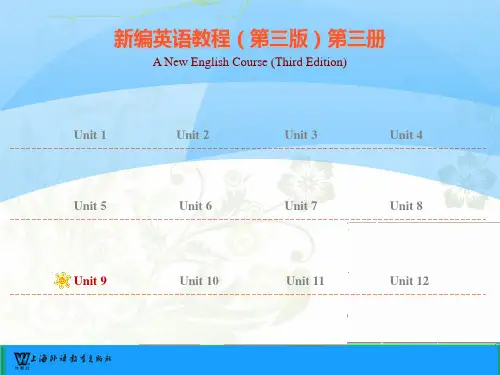
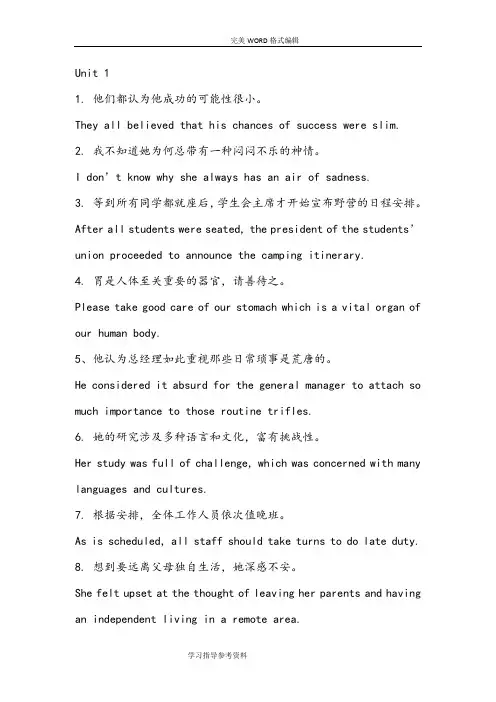
Unit 11. 他们都认为他成功的可能性很小。
They all believed that his chances of success were slim.2. 我不知道她为何总带有一种闷闷不乐的神情。
I don’t know why she always has an air of sadness.3. 等到所有同学都就座后,学生会主席才开始宣布野营的日程安排。
After all students were seated, the president of the students’ union proceeded to announce the camping itinerary.4. 胃是人体至关重要的器官,请善待之。
Please take good care of our stomach which is a vital organ of our human body.5、他认为总经理如此重视那些日常琐事是荒唐的。
He considered it absurd for the general manager to attach so much importance to those routine trifles.6. 她的研究涉及多种语言和文化,富有挑战性。
Her study was full of challenge, which was concerned with many languages and cultures.7. 根据安排,全体工作人员依次值晚班。
As is scheduled, all staff should take turns to do late duty.8. 想到要远离父母独自生活,她深感不安。
She felt upset at the thought of leaving her parents and having an independent living in a remote area.9. 对于她是否胜任这份工作我们不甚担心,我们所担忧的却是她的健康状况。
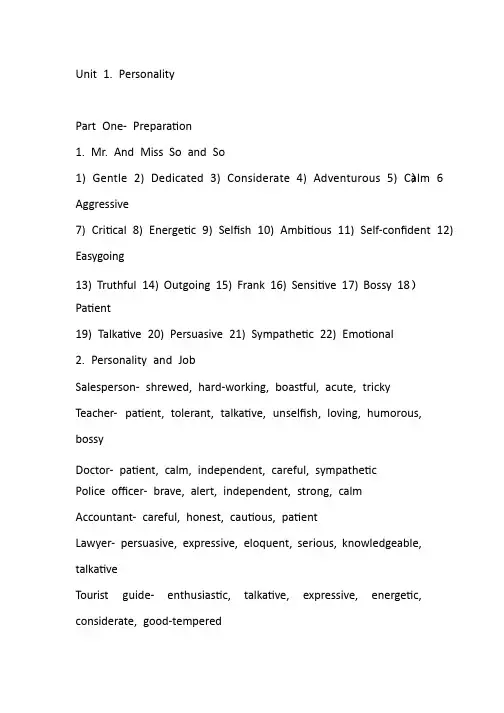
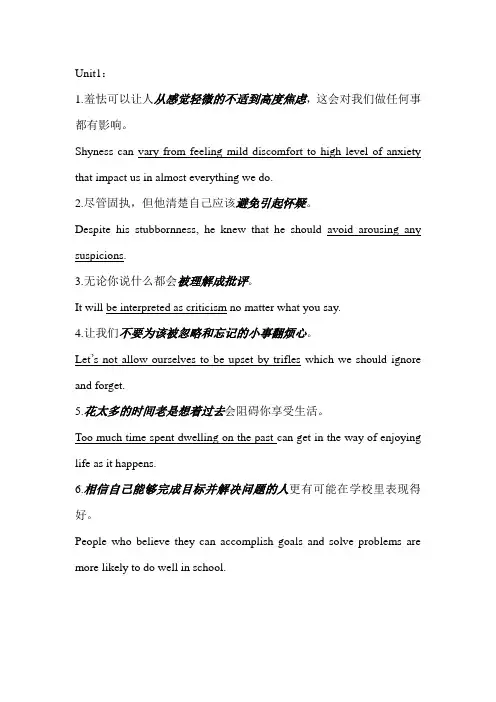
1.羞怯可以让人从感觉轻微的不适到高度焦虑,这会对我们做任何事都有影响。
Shyness can vary from feeling mild discomfort to high level of anxiety that impact us in almost everything we do.2.尽管固执,但他清楚自己应该避免引起怀疑。
Despite his stubbornness, he knew that he should avoid arousing any suspicions.3.无论你说什么都会被理解成批评。
It will be interpreted as criticism no matter what you say.4.让我们不要为该被忽略和忘记的小事翻烦心。
Let’s not allow ourselves to be upset by trifles which we should ignore and forget.5.花太多的时间老是想着过去会阻碍你享受生活。
Too much time spent dwelling on the past can get in the way of enjoying life as it happens.6.相信自己能够完成目标并解决问题的人更有可能在学校里表现得好。
People who believe they can accomplish goals and solve problems are more likely to do well in school.1.她穿了一条有玫瑰团的裙子。
She wore a dress with a pattern of roses on it.2.Helen为我们准备了一顿丰盛的晚饭。
Helen had prepared a wonderful meal for us.3.Ann信誓旦旦的保证她不会说出去。
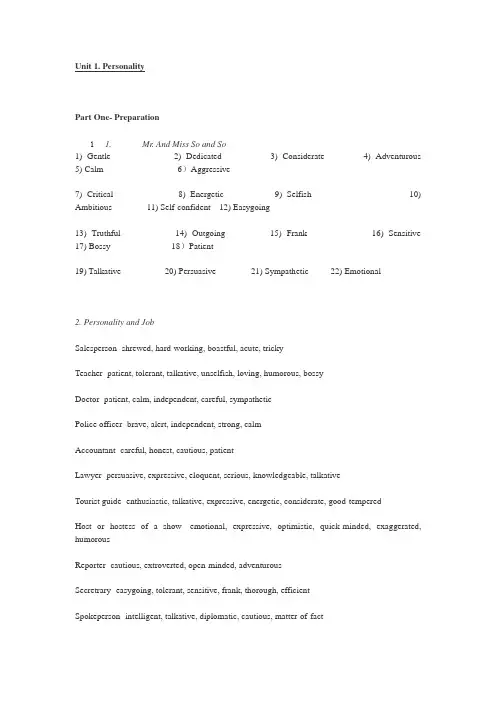
Unit 1. PersonalityPart One- Preparation1. Mr. And Miss So and So1) Gentle 2) Dedicated 3) Considerate 4) Adventurous 5) Calm 6)Aggressive7) Critical 8) Energetic 9) Selfish 10) Ambitious 11) Self-confident 12) Easygoing13) Truthful 14) Outgoing 15) Frank 16) Sensitive 17) Bossy 18)Patient19) Talkative 20) Persuasive 21) Sympathetic 22) Emotional2. Personality and JobSalesperson- shrewed, hard-working, boastful, acute, trickyTeacher- patient, tolerant, talkative, unselfish, loving, humorous, bossyDoctor- patient, calm, independent, careful, sympatheticPolice officer- brave, alert, independent, strong, calmAccountant- careful, honest, cautious, patientLawyer- persuasive, expressive, eloquent, serious, knowledgeable, talkativeTourist guide- enthusiastic, talkative, expressive, energetic, considerate, good-temperedHost or hostess of a show- emotional, expressive, optimistic, quick-minded, exaggerated, humorousReporter- cautious, extroverted, open-minded, adventurousSecretrary- easygoing, tolerant, sensitive, frank, thorough, efficientSpokeperson- intelligent, talkative, diplomatic, cautious, matter-of-factPart Two – Post-readingReading ComprehensionUnderstanding the Organization of the Text1) Introduction: (para1)Shyness is the cause of much unhappiness for a great many people2) Reasons why shyness can have a negative effect: (para2-3)People’ s self-concept has a profound effect on all areas of their lives.People with high self-esteem unsually act with confidence.People with low self-esteem are likey to be passive and easily influenced by others.3) Ways of overcoming shyness: (para 4-15)i) Recognize your personal strengths and weaknesses.ii) Set reasonable goals.iii) Don’t waste time and energy on destructive feelings such as guilt and shame.iv) Don’t be afraid to speak up and give your point of view.v) Do not make negative comments about yourself.vi) Accept criticism thoughfully.vii) Profit from failures and disappointments by viewing them as learning experiences.viii) Do not associate with people who make you feel inadequate.ix) Set aside time to relax, enjoy hobbies, and reevaluate your goals regularly.x) Practice being in social situations.4) Conclusion: (para16)The better we understand ourselves, the easier it becomes to live up to our full potential.2. Understanding Specific Information1) F 2) T 3) T 4) T 5) F 6)T 7)F 8)F 9)TVocabulary1.1) self-couscious (worried and embarrassed about what you look like or what other people think of you.)2) self-confidence (belief in one’s own ability, power, judgment, etc,; confidence in oneself)3) self-esteem (the feeling that you are someone who deserves to be liked, respected, or admired)4) self-destructive (with thoughts or actions that are counter to one’s own best interests)5) self-worth (the value you give to your life and achievements)6) self-concept (one’s conception or general idea of one’s own basic character and nature)7) self-awareness (realistic knowledge and judgment about oneself)8) self-assurance/self-confidence (the belief that you are able to deal with people and problems easily)2.1) B 2 ) I 3) L 4) A 5) H 6) D 7) E8) N 9) J 10) M 11) C 12) F 13) G 14) K3.1) profound 2)jealousy 3) numerous 4)overweight 5) overcome6) eventually 7) slim 8) compliments 9) diminish 10) reassurance11) detrimental 12) isolated 13) self-esteem 14) accented4.1) reflected 2) concerned/worried 3) profound effect/influence 4) viewed/regarded5) sensitive 6) respond/ react 7) eliminated 8) overcome my fear9) concentrate on 10) made no commentTranslation1) You should spend a reasonable amount of time relaxing and exercising.(spend time on sth/ in doing sth)2) In general children are healthier and better educated than ever before. (than ever before)3) When the right opportunity comes along, he’ll take it.4) Every day he sets aside some time to be with his family and enjoy life.5) I remember those dark streets and walking hand in hand with my father.6) He finally failed to live up to his parents’ expectations.7) In contrast, our use of oil has increased enormously.8) He succeeded in his efforts to overcome his fatal weakness.Part Three – Further Development1. Enriching Your Word Power1) B 2)B 3)A 4) B 5) D 6) C 7)B 8)C 9)A 10)A 11) C 12) BPart Four- Writing and Translation2.1) It is believed that pessimism often leads to hopelessness, sickness and failure.2) Optimism, by contrast, can make you happy, healthy and successful.3) When you fail in something, profit from the failure as a learning experience.4) Think about your strengths and build up self-confidence in front of problems or difficulties.5) Don’t let negative thoughts hold you back.6)Everyone has experienced failures and disappointments, so don’t blame yourself too much.Unit 2 Myths and LegendsPart One – Preparation4. Matching Pictures1. Aphrodite2. Ares3. Hephaestus4. Artemis5. Demeter6. Dionysus7. Poseidon 8. Athena 9. Apollo 10. hermes 11. Hera 12. ZeusPart Two – Post-reading1. Testing Your Memory1) Because they were invited to a feast in the sky.2) He saw the birds were busy preparing.3) He planned to go to the feast/ sky with the birds.4) They didn’t agree because Tortoise was mischievous/ cunning and ungrateful.5) With a sweet tongue, he convinced the birds that he was a changed man.6) He made two wings with all the features he got from each bird.7) All of You.8) Nuts, meat and fish soup, punded yam, yam soup, palm wine, etc.9) For whom have you prepared this feast?10) Because he knew the answer would be “For all of you”, which was his new name. So he could enjoy all the food first.11) They were very angry.12) They took back the feathers they had lent him.13) He asked him to take a message to his wife.14) Parrot, because he wanted to take advantage of the chance to get revenge.15) He asked Parrot to tell his wife to bring out all the soft things in his house and cover the ground with them so that he would be able to land safely. But Parrot told his wife to bring out all the hard and sharp things instead.16) His shell was broken into hundreds of pieces.Vocabulary1.1) A. invitation B. invited C. inviting2) A. prepare B. prepared C. preparation D. preparatory / preparation3) A. discoveries B. discoverers C. discovered4) A. approval B. approve C. approved D. approvign E. disapprove5) A. eloquent B. eloquence C. eloquently6) A. faithful B. unfaithful/ faithless C. faith D. faithfully7) A. occasional B. occasionally C. occasion8) A. delivery B. delivering C. delivered9) A. troubesome B. troulbed C. troubled D. troubling10) A. assurance B. assured C. assure2.1) got/ran into trouble 2) no trouble 3) asking for trouble 4) have…trouble5) trouble with 6) in serious/ deep/ big trouble 7) get/getting …into trouble 8) took the trouble3.1) with a pattern of roses.2) prepared a wonderful / good meal for us3) promised faithfully4) deliver this letter5) a selection of milk and plain chocolate6) keep out of mischief / behave themselves7)the sound of distant thunder8) received approval from the government9) in spite of the fact that he drank too much10)agree whether the drug is safe or notPart Three – Further Development3 1. Enriching Your Word Power1) C 2) C 3) A 4) B 5)A 6) B 7) A 8) B 9) B 10) A 11) B 12) APart Four – Writing and Translation4 2. Translation Practice万物之初,天体还是一体,充满混沌。

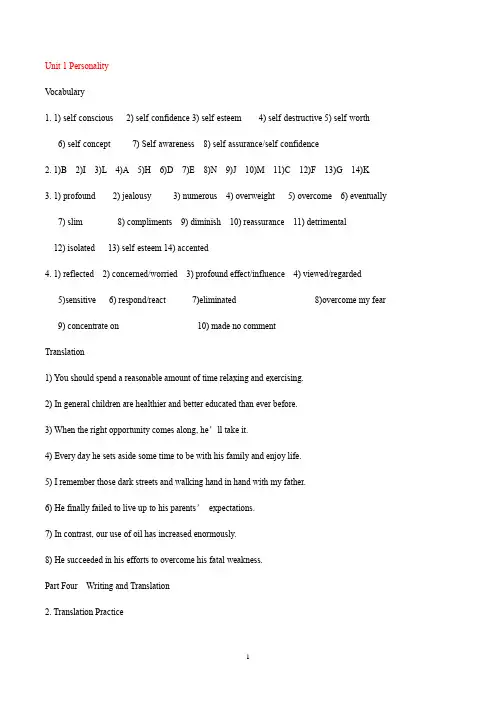
Unit 1 PersonalityV ocabulary1. 1) self-conscious 2) self-confidence 3) self-esteem 4) self-destructive 5) self-worth6) self-concept 7) Self-awareness 8) self-assurance/self-confidence2. 1)B 2)I 3)L 4)A 5)H 6)D 7)E 8)N 9)J 10)M 11)C 12)F 13)G 14)K3. 1) profound 2) jealousy 3) numerous 4) overweight 5) overcome 6) eventually7) slim 8) compliments 9) diminish 10) reassurance 11) detrimental12) isolated 13) self-esteem 14) accented4. 1) reflected 2) concerned/worried 3) profound effect/influence 4) viewed/regarded5)sensitive 6) respond/react 7)eliminated 8)overcome my fear9) concentrate on 10) made no commentTranslation1) You should spend a reasonable amount of time relaxing and exercising.2) In general children are healthier and better educated than ever before.3) When the right opportunity comes along, he’ll take it.4) Every day he sets aside some time to be with his family and enjoy life.5) I remember those dark streets and walking hand in hand with my father.6) He finally failed to live up to his parents’expectations.7) In contrast, our use of oil has increased enormously.8) He succeeded in his efforts to overcome his fatal weakness.Part Four Writing and Translation2. Translation Practice1) It is believed that pessimism often leads to hopelessness, sickness and failure.2) Optimism, by contrast, can make you happy, healthy and successful.3) When you fail in something, profit from the failure as a learning experience.4) Think about your strengths and build up self-confidence in front of problems or difficulties.5) Don’t let negative thoughts hold you back.6) Everyone has experienced failures and disappointments, so don’t blame yourself too much.Unit 2 Myths and LegendsV ocabulary1. 1) A. invitation B. invited C. inviting 2) A. prepare B. prepared C. preparation D.preparatory/preparation3) A. discoveries B. discoverers C. discovered4) A. approval B. approve C. approved D. approving E. disapprove5) A. eloquent B. eloquence C. eloquently6) A. faithful B. unfaithful/faithless C. faith d. faithfully7) A. occasional B. occasionally C. occasion8) A. delivery B. delivering C. delivered9) A. troublesome B. troubled C. troubled D. troubling 10) A. assurance B. assured C. assure2. 1) got/ran into trouble 2) no trouble 3) asking for trouble 4) have …trouble 5) troublewith6) in serious/deep/big trouble 7) get/getting …into trouble 8) took the trouble3. 1) with a pattern of roses 2) prepared a wonderful/goof meal for us3) promised faithfully 4) deliver this letter5) a selection of milk and plain chocolate 6) keep out of mischief/behave themselves7) the sound of distant thunder 8) received approval from the government9) in spite of the fact that he drank too much 10) agree whether the drug is safe or notPart Three Further Development5. Complete the following Ancient Chinese story by translating the Chinese into English1) the true reason why there was no such animal in Guizhou2) they were of no use at all in this place3) when he saw the donkey all of a sudden, he thought it was a monster4) he hid himself in the trees while looking at the donkey5) what kind of animal is this and why does it look different from other animals that I’ve seen?6) But one day the donkey stretched its thin neck and cried7) the tiger discovered that the donkey didn’t have any other skills besides crying8) But he dared not rush to it and eat it just as he did to other animals9) This did irritate the donkey (made the donkey angry), who raised its hind leg and kicked thetiger10) This time he rushed to it without hesitation and bit its rhroatPart Four Writing and Translation2. Translation Practice万物之初天地还是一体充满混沌。
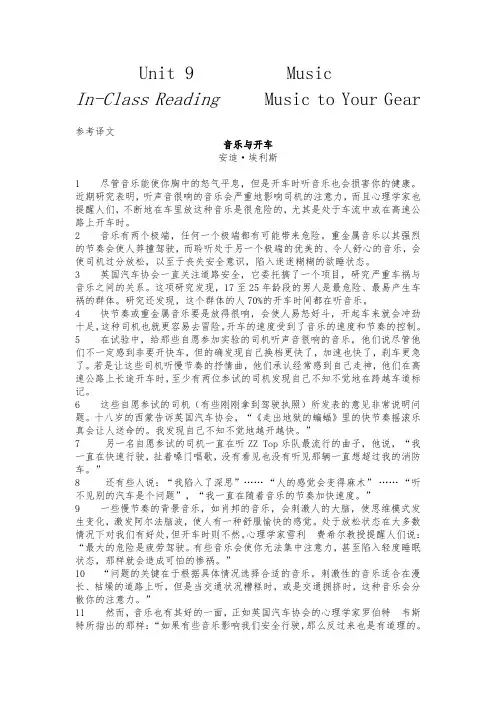
Unit 9 MusicIn-Class Reading Music to Your Gear参考译文音乐与开车安迪·埃利斯1 尽管音乐能使你胸中的怒气平息,但是开车时听音乐也会损害你的健康。
近期研究表明,听声音很响的音乐会严重地影响司机的注意力,而且心理学家也提醒人们,不断地在车里放这种音乐是很危险的,尤其是处于车流中或在高速公路上开车时。
2 音乐有两个极端,任何一个极端都有可能带来危险。
重金属音乐以其强烈的节奏会使人莽撞驾驶,而聆听处于另一个极端的优美的、令人舒心的音乐,会使司机过分放松,以至于丧失安全意识,陷入迷迷糊糊的欲睡状态。
3 英国汽车协会一直关注道路安全,它委托搞了一个项目,研究严重车祸与音乐之间的关系。
这项研究发现,17至25年龄段的男人是最危险、最易产生车祸的群体。
研究还发现,这个群体的人70%的开车时间都在听音乐。
4 快节奏或重金属音乐要是放得很响,会使人易怒好斗,开起车来就会冲劲十足,这种司机也就更容易去冒险。
开车的速度受到了音乐的速度和节奏的控制。
5 在试验中,给那些自愿参加实验的司机听声音很响的音乐,他们说尽管他们不一定感到非要开快车,但的确发现自己换档更快了,加速也快了,刹车更急了。
若是让这些司机听慢节奏的抒情曲,他们承认经常感到自己走神,他们在高速公路上长途开车时,至少有两位参试的司机发现自己不知不觉地在跨越车道标记。
6 这些自愿参试的司机(有些刚刚拿到驾驶执照)所发表的意见非常说明问题。
十八岁的西蒙告诉英国汽车协会,“《走出地狱的蝙蝠》里的快节奏摇滚乐真会让人送命的。
我发现自己不知不觉地越开越快。
”7 另一名自愿参试的司机一直在听ZZ Top乐队最流行的曲子,他说,“我一直在快速行驶,扯着嗓门唱歌,没有看见也没有听见那辆一直想超过我的消防车。
”8 还有些人说:“我陷入了深思”…… “人的感觉会变得麻木” …… “听不见别的汽车是个问题”,“我一直在随着音乐的节奏加快速度。
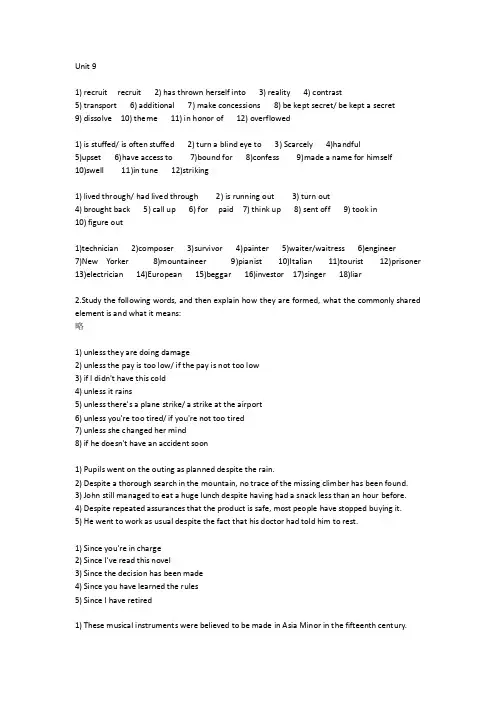
Unit 91) recruit recruit 2) has thrown herself into 3) reality 4) contrast5) transport 6) additional 7) make concessions 8) be kept secret/ be kept a secret9) dissolve 10) theme 11) in honor of 12) overflowed1) is stuffed/ is often stuffed 2) turn a blind eye to 3) Scarcely 4)handful5)upset 6)have access to 7)bound for 8)confess 9)made a name for himself10)swell 11)in tune 12)striking1) lived through/ had lived through 2) is running out 3) turn out4) brought back 5) call up 6) for paid 7) think up 8) sent off 9) took in10) figure out1)technician 2)composer 3)survivor 4)painter 5)waiter/waitress 6)engineer7)New Yorker 8)mountaineer 9)pianist 10)Italian 11)tourist 12)prisoner 13)electrician 14)European 15)beggar 16)investor 17)singer 18)liar2.Study the following words, and then explain how they are formed, what the commonly shared element is and what it means:略1) unless they are doing damage2) unless the pay is too low/ if the pay is not too low3) if I didn't have this cold4) unless it rains5) unless there's a plane strike/ a strike at the airport6) unless you're too tired/ if you're not too tired7) unless she changed her mind8) if he doesn't have an accident soon1) Pupils went on the outing as planned despite the rain.2) Despite a thorough search in the mountain, no trace of the missing climber has been found.3) John still managed to eat a huge lunch despite having had a snack less than an hour before.4) Despite repeated assurances that the product is safe, most people have stopped buying it.5) He went to work as usual despite the fact that his doctor had told him to rest.1) Since you're in charge2) Since I've read this novel3) Since the decision has been made4) Since you have learned the rules5) Since I have retired1) These musical instruments were believed to be made in Asia Minor in the fifteenth century.2) Their government is said to be sending two representatives to the regional conference to be held in Bangkok next month.3) The death toll from the earthquake is reported to have risen to five thousand or more4) The blackout in a busy section of the town last night is said to have resulted from a terrorist attack .5) Emma is thought to have made a serious mistake by refusing to reach a compromise with her opponents.1)in contrast 2)reality 3)Amid 4)stage 5)threw themselves into6)kept a secret 7)additional 8)instrument 9)triumph 10)audience11)swelled 12)passion 13)pay for1)how 2)got 3)women 4)ordered 5)an 6)who 7)had 8)these9)said 10)from 11)with 12)hand 13)no 14)hair 15)a 16)it 17)delight18)tears 19)At 20)there 21)later 22)found 23)on 24)still 25)lifting26)heads 27)alive 28)full 29)contained 30)did 31)at 32)feet 33)smokingDictationThe Terezin concentration camp was established by the Nazis in an 18th century fortress in Czechoslovakia on November 24, 1941. More than 150,000 Jews passed through the camp during its four-year existence, which was used as a holding area for eventual murder in Auschwitz. By 1943, rumors began circulating in the international community that the Nazis were exterminating Jews in gas chambers, and that the conditions of the concentration camps did not permit survival. The Nazis rebuilt parts of this camp to serve as a "showpiece" for propaganda purposes. Flowers were planted there. Shops, schools, and a cafe were built. When an investigating commission of the International Red Cross came to visit, they did not see a typical concentration camp. In July 1944 the Nazis made a documentary propaganda film about life in this camp. After the movie was completed, most of the Jewish "actors" were shipped to their death at Auschwitz.翻译今年三月初的一个美好夜晚,我和我的家人到上海大剧院(Shanghai Grand Theater)看著名的音乐剧(musical)《剧院魅影》(#The Phantom of the Opera#)。
1. Complete each of the following sentences with an appropriate form of the word in brackets.1.(attention)Correct answerinattention2.(qualify)Correct answerqualifiedCorrect answerNavigation4.Correct answerparticipants5.Correct answerunconscious6.Correct answercompetence7.Correct answerinequalities8.morning. (request)Correct answerrequested9.Correct answervaried10.Correct answerpartners2. Fill in each of the blanks with an appropriate preposition or adverb.11.Correct answerin12.Correct answerof13.Correct answerto14.accident.Correct answerat15.Correct answerbeyond16.Your answer Correct answerfrom from17.Your answer Correct answerto to18.Your answer Correct answeron on19.Your answer Correct answerin inYour answer Correct answerOn On3. Complete each of the following sentences by choosing the best answerfrom the choices given.21. The buses, ___________ were already full, were surrounded by an angry crowd.A. most of whichB. both of whichC. few of themD. those of which22. There's only one man ____________ the job.A. qualified forB. qualifying ofC. qualified toD. qualifying for23. The topic is ____________ my field.A. offB. beyondC. belowD. beneath24. Very seldom ____________ that two clocks or watches exactly agree.A. you findB. you will findC. you do findD. do you find25. I was ___________ by my grandmother in the western suburbs of Hangzhou.A. brought onB. brought aboutC. brought upD. brought out26. I'm sorry to ____________ on your conversation.A. cut acrossB. cut outC. cut inD. cut down27. A fire _____________ during the night when all the workers were asleep.A. broke upB. broke throughC. broke inD. broke out28. The plane _____________ despite the dense fog.A. took offB. took downC. took upD. took on29. Burning leaves _____________ thick smoke hovering over the small village.A. gave outB. gave upC. gave offD. gave in30. After Tom passed his driving test, he ___________ an application for hisdriver's license.A. filled awayB. filled outC. filled upD. filled with。
新编大学英语综合教程3(第三版)课后翻译答案1.羞怯可以让人从感觉轻微的不适到高度焦虑,这会对我们做任何事都有影响。
Shyness can vary from feeling mild discomfort to high level of anxiety that impact us in almost everything we do.2.尽管固执,但他清楚自己应该避免引起怀疑。
Despite his stubbornness, he knew that he should avoid arousing any suspicions.3.无论你说什么都会被理解成批评。
It will be interpreted as criticism no matter what you say.4.让我们不要为该被忽略和忘记的小事翻烦心。
Let’s not allow ourselves to be upset by trifles which we should ignore and forget.5.花太多的时间老是想着过去会阻碍你享受生活。
Too much time spent dwelling on the past can get in the way of enjoying life as it happens.6.相信自己能够完成目标并解决问题的人更有可能在学校里表现得好。
People who believe they can accomplish goals and solve problems are more likely to do well in school.1.她穿了一条有玫瑰团的裙子。
She wore a dress with a pattern of roses on it.2.Helen为我们准备了一顿丰盛的晚饭。
Helen had prepared a wonderful meal for us.3.Ann信誓旦旦的保证她不会说出去。
新编⼤学英语第三版综合教程3答案Unit 1 PersonalityVocabulary1. 1) self-conscious 2) self-confidence 3) self-esteem 4) self-destructive 5) self-worth6) self-concept 7) Self-awareness 8) self-assurance/self-confidence2. 1)B 2)I 3)L 4)A 5)H 6)D 7)E 8)N 9)J 10)M 11)C 12)F 13)G 14)K3. 1) profound 2) jealousy 3) numerous 4) overweight 5) overcome 6) eventually7) slim 8) compliments 9) diminish 10) reassurance 11) detrimental12) isolated 13) self-esteem 14) accented4. 1) reflected 2) concerned/worried 3) profound effect/influence 4) viewed/regarded5)sensitive 6) respond/react 7)eliminated 8)overcome my fear9) concentrate on 10) made no commentTranslation1) You should spend a reasonable amount of time relaxing and exercising.2) In general children are healthier and better educated than ever before.3) When the right opportunity comes along, he’ll take it.4) Every day he sets aside some time to be with his family and enjoy life.5) I remember those dark streets and walking hand in hand with my father.6) He finally failed to live up to his parents’expectations.7) In contrast, our use of oil has increased enormously.8) He succeeded in his efforts to overcome his fatal weakness.Part Four Writing and Translation2. Translation Practice1) It is believed that pessimism often leads to hopelessness, sickness and failure.2) Optimism, by contrast, can make you happy, healthy and successful.3) When you fail in something, profit from the failure as a learning experience.4) Think about your strengths and build up self-confidence in front of problems or difficulties.5) Don’t let negative thoughts hold you back.6) Everyone has experienced failures and disappointments, so don’t blame yourself too much.Unit 2 Myths and LegendsVocabulary1. 1) A. invitation B. invited C. inviting 2) A. prepare B. prepared C. preparation D. preparatory/preparation3) A. discoveries B. discoverers C. discovered4) A. approval B. approve C. approved D. approving E. disapprove5) A. eloquent B. eloquence C. eloquently6) A. faithful B. unfaithful/faithless C. faith d. faithfully7) A. occasional B. occasionally C. occasion8) A. delivery B. delivering C. delivered9) A. troublesome B. troubled C. troubled D. troubling 10) A. assurance B. assured C. assure2. 1) got/ran into trouble 2) no trouble 3) asking for trouble 4) have …trouble 5) troublewith6) in serious/deep/big trouble 7) get/getting …into trouble 8) took the trouble3. 1) with a pattern of roses 2) prepared a wonderful/goof meal for us3) promised faithfully 4) deliver this letter5) a selection of milk and plain chocolate 6) keep out of mischief/behave themselves7) the sound of distant thunder 8) received approval from the government9) in spite of the fact that he drank too much 10) agree whether the drug is safe or notPart Three Further Development5. Complete the following Ancient Chinese story by translating the Chinese into English1) the true reason why there was no such animal in Guizhou2) they were of no use at all in this place3) when he saw the donkey all of a sudden, he thought it was a monster4) he hid himself in the trees while looking at the donkey5) what kind of animal is this and why does it look different from other animals that I’ve seen?6) But one day the donkey stretched its thin neck and cried7) the tiger discovered that the donkey didn’t have any other skills besides crying8) But he dared not rush to it and eat it just as he did to other animals9) This did irritate the donkey (made the donkey angry), who raised its hind leg and kicked thetiger10) This time he rushed to it without hesitation and bit its rhroatPart Four Writing and Translation2. Translation Practice万物之初天地还是⼀体充满混沌。
Unit11 Shyness can vary from feeling mild discomfort to high levels of anxiety (从感觉轻微的不适高度的焦虑) that impact us in almost everything we do.2 Despite his stubbornness, he knew in his heart that he should avoid arousing any suspicions(避免引起任何怀疑).3 It will be interpreted as criticism no matter what you say.(成批评,无论你说什么).4 Let’s not allow ourselves to be upset by trifles (让我们不要为小事情烦心) (which) we shouldignore and forget.5 Too much time spent dwelling on the past (花太多的时间老是想着过去) can get in the way ofenjoying life as it happens.6 People who believe they can accomplish goals and solve problems (相信自己能够完成目标并解决问题的人) are more likely to do well in school.Unit21.She wore a dress with pattern of roses (有玫瑰图案)on it.2.Helen had prepared a wonderful meal for us.(为我们准备了一顿丰盛的饭菜)3.Ann promised faithfully (信誓旦旦地保证)that she would never tell.4.Could you deliver this letter(把这封信送到)to the accounts department?5.We well offered a selection of milk and plain chocolate.(精选的牛奶巧克力和纯巧克力)6.Tell the children to keep out of mischief themselves.(别胡闹)7.We could hear the sound of distant thunder.(远处打雷的声音)8.The project has now received approval form the government .(得到政府的批准)9.Kelly loved her husband in spite of the fact that he drank too much.(虽然他喝酒太多)10.Experts seem unable to agree whether the drug is safe or not .(就这个药是否安全取得一致意见)Unit 31.由于紧急情况,这个医生几小时内都没有空Because of an emergency, the doctor will not be available for several hours.2.税收将会如何影响低收入的人?How will taxes affect people with low incomes?3.我母亲总是告诉我,从长远来看我会很高兴我没有放弃练钢琴My mother always told me that in the long run I would be glad I didn’t give up practicing thepiano.4.这些书的价格从10美元到20美元不等These book range in price from $10 to $20.5.在我看来你没有什么选择6.It seems to me that you don’t have much choice.6.考虑到他们缺乏经验,这工作他们已做的相当不错了Given their inexperience, they have done quite a good job.7. 对这么一幢大房子来说这价格相当便宜,但你得考虑维修费用For such a big house the price is fairly low/cheap, but you’ve got to take into consideration the money you will spend on repairs.8.我们能否从讨论上会议产生的问题开始?Can we begin with discussing questions arising from the last meeting?Unit 41. I used to enjoy photography,(我过去喜欢摄影)but I now have no time to pursue any hobbies.2. There is no sure way to predict (没有一种可确信的方式来预测)who will develop asthma and who won’t.3. Today neurobiologists no longer argue about whether or not the brain can grow new cells.(大脑是否能生成新细胞)4. I don’t love actingas much as I once did(像以前那样), said Angelina Jolie.direction you should be heading.(你应5.If you don’t define your goal ,you don’t know in which该向哪个方向前进)6.While you should not dwell on your past ,spending some time reviewing and thinking about thepath you have taken.(花些时间回顾和思考你走过的路)7.You may love someone but not necessarily have to marry him.(不一定得和他结婚)8.These examples demonstrate how poorly some students write their resumes.(有些学生的简历写得多么差)Unit 51.Seeing all the people walking to and fro outside the office ,(看到所有的人在办公室外面走来走去)I became more worried.2.In time he well see who is his true friend to be relied on in difficulty。
1. Complete each of the following sentences with an appropriate form of the word in brackets.
1.
(attention)
Correct answer
inattention
2.
(qualify)
Correct answer
qualified
Correct answer
Navigation
4.
Correct answer
participants
5.
Correct answer
unconscious
6.
Correct answer
competence
7.
Correct answer
inequalities
8.
morning. (request)
Correct answer
requested
9.
Correct answer
varied
10.
Correct answer
partners
2. Fill in each of the blanks with an appropriate preposition or adverb.
11.
Correct answer
in
12.
Correct answer
of
13.
Correct answer
to
14.
accident.
Correct answer
at
15.
Correct answer
beyond
16.
Your answer Correct answer
from from
17.
Your answer Correct answer
to to
18.
Your answer Correct answer
on on
19.
Your answer Correct answer
in in
Your answer Correct answer
On On
3. Complete each of the following sentences by choosing the best answer
from the choices given.
21. The buses, ___________ were already full, were surrounded by an angry crowd.
A. most of which
B. both of which
C. few of them
D. those of which
22. There's only one man ____________ the job.
A. qualified for
B. qualifying of
C. qualified to
D. qualifying for
23. The topic is ____________ my field.
A. off
B. beyond
C. below
D. beneath
24. Very seldom ____________ that two clocks or watches exactly agree.
A. you find
B. you will find
C. you do find
D. do you find
25. I was ___________ by my grandmother in the western suburbs of Hangzhou.
A. brought on
B. brought about
C. brought up
D. brought out
26. I'm sorry to ____________ on your conversation.
A. cut across
B. cut out
C. cut in
D. cut down
27. A fire _____________ during the night when all the workers were asleep.
A. broke up
B. broke through
C. broke in
D. broke out
28. The plane _____________ despite the dense fog.
A. took off
B. took down
C. took up
D. took on
29. Burning leaves _____________ thick smoke hovering over the small village.
A. gave out
B. gave up
C. gave off
D. gave in
30. After Tom passed his driving test, he ___________ an application for his
driver's license.
A. filled away
B. filled out
C. filled up
D. filled with。